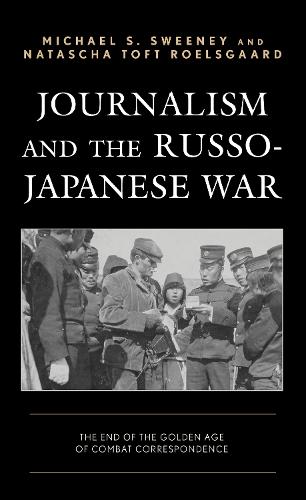
Journalism and the Russo-Japanese War: The End of the Golden Age of Combat Correspondence
(Hardback)
Available Formats
Publishing Details
Journalism and the Russo-Japanese War: The End of the Golden Age of Combat Correspondence
By (Author) Michael S. Sweeney
By (author) Natascha Toft Roelsgaard
Bloomsbury Publishing PLC
Lexington Books
21st November 2019
United States
Classifications
Professional and Scholarly
Non Fiction
Specific wars and military campaigns
News media and journalism
070.449952031
Winner of AJHA (American Journalism History Association) Book of the Year Award 2020
Physical Properties
Hardback
260
Width 159mm, Height 234mm, Spine 20mm
526g
Description
This book examines the journalistic coverage and challenges during the Russo-Japanese War of 190405, what some have called World War Zero. The authors explore how Japan delayed and regulated correspondents so they could do no harm to the nation's ambitions at home or abroad and implemented methods of shaping the news. They argue Japan helped to shape the modern world of journalism by creating and packaging "truth."
Reviews
For a war that's not much talked about these days, the 1904-05 Russo-Japanese War was pivotal not just for its antagonists but for the entire world. It launched victorious Japan, the first Asian power to defeat a European one in the modern era, on its destructive path toward imperial expansion, which eventually morphed into World War II. For the Russian Empire, soundly trounced in battle after battle, defeat marked the end of its military aspirations in the Far East and helped trigger the 1905 Revolution, which led to the 1917 Revolution and all that followed.
Journalism scholars Michael S. Sweeney and Natascha Toft Roelsgaard argue that it also triggered another key historical development in helping to shape the rise of modern forms of propaganda and censorship, particularly as practised in wartime.
In their superbly researched study Journalism and the Russo-Japanese War, they argue that Japan's then-unprecedented treatment of western war correspondents helped establish a template which has persisted around the world to greater or lesser degrees to this day....
Sweeney and Roelsgaard offer a fascinating, engaging and erudite study of this process, shining an enthralling and thought-provoking light on an often-forgotten conflict, the reporters who covered it, and the impact that war had on shaping the journalism we know today.
-- "Popmatters"In Journalism and the Russo-Japanese War, Sweeney and Roelsgaard seek to present a clear description of the role of the press during the Russo-Japenese War and the impact that conflict had on the future of journalism during military combat. This book makes a very engaging and important argument that clearly helps the reader to better understand the nature of the modern media and some of the important events that have influenced its development. Overall, the authors do a good job in presenting the various issues that journalist faced in gaining access in order to report on the war.
-- "Journalism History"Author Bio
Michael S. Sweeney is professor in the E.W. Scripps School of Journalism at Ohio University. Natascha Toft Roelsgaard is doctoral student in the E.W. Scripps School of Journalism at Ohio University.
